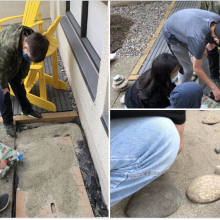Innovation Inquiry Grants in 2019-2020
The 2019-20 school year saw an increase in Innovation Inquiry Grants. Forty-seven schools applied for and received a total of 98 grants in the following areas:
- Big Ideas & Inquiry – 6 schools
- Inclusive Learning Communities – 8 schools
- Social Emotional Learning (SEL) – 10 schools
- Assessment
- Student Reporting Policy Pilot (SRPP) – 36 schools
- Formative assessment – 4 schools
- Learning Environments – 17 schools
- Library Learning Commons – 17 schools
As in the previous years, the innovation inquiry grant process is intended to enhance collaborative inquiry, professional learning, and student learning in our schools. Providing opportunities for educators to learn and work together at their schools and network with educators from other schools strengthens learning for everyone.
The completion of the 2019-20 innovation inquiry grants cycle was impeded by the onset of the COVID-19 pandemic. Teachers and teachers consultants continued to provide support for the inquiry learning that teachers had embarked upon, but the focus post spring break needed to turn to providing remote learning for students. As well, the Innovation Celebration was cancelled in recognition of other priorities and the challenges of coordinating a virtual Innovation Celebration which has typically been an incredible opportunity for educators to come together to share professional inquiry learning while also socializing and networking.
Innovation Inquiry Grants in 2020-21
Despite the setbacks brought upon us by the pandemic, the Assessment & Innovation Committee continued to look ahead to a time when teachers would be back at school with students. The Committee also recognized that it was important to maintain the central foci of innovation inquiry grants which is to encourage and support: collaborative teams, professional inquiry, pedagogical practice, and integration of digital tools.
During challenging times, it is vital to be sensitive and aware of educators’ diverse needs. As a committee, we were aware that while some educators might be focusing on practices other than innovation inquiry grants, there were also many educators looking for support through collaboration and a means to engage in their curiosity about learning during a pandemic. As a result information about the innovation inquiry grants was sent to schools, as it has been for many years. As always, the innovation inquiry grant process is voluntary and because of the nature of the current school year, the A&I Committee thought that the number of applications would decrease. When the application process was completed, the A&I Committee was pleased to see how many applications were received and approved.
During the 2020-21 school year, we are supporting innovation inquiry grants in many schools. We have, however, observed a redistribution of the areas of inquiry from previous years. The greatest innovation inquiry grant participation is in the area of Communicating Student Learning (CSL) with approximately 460 teachers. CSL provides school teams with the opportunity to communicate student learning through Option A of the Student Reporting Policy. There is strong interest, particularly in our elementary schools, in communicating student learning using Option A. In total, forty-six schools and approximately 600 educators received innovation inquiry grants in the following areas:
- Learning through Inquiry – 4 schools
- Inclusive Learning Communities – 5 schools
- Social Emotional Learning (SEL and SEL-SOGI) – 13 schools
- Assessment
- Communicating Student Learning – 38 schools
- Formative Assessment – 2 schools
- Learning Environments – 6 schools
- Library Learning Commons – 9 schools
In addition to the above grants, there are eleven schools participating in Learning Environments and Spaces Pilot Grants. These schools are providing examples of how we can create learning environments that support student learning in alignment with BC’s redesigned curriculum.
Conclusion
From the feedback we receive throughout the school year and at previous year-end Innovation Celebrations, educators throughout the district appreciate the opportunity that innovation inquiry grants provide to engage in learning together, employ new pedagogical practices, and deepen implementation of the K-9 and 10-12 curriculum.
